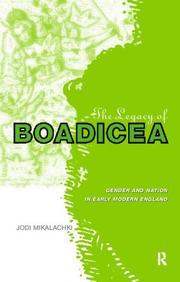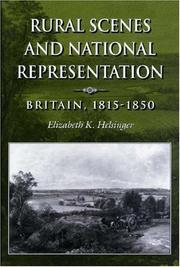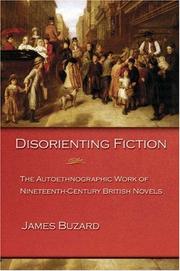| Listing 1 - 4 of 4 |
Sort by
|
Book
ISBN: 9781409430506 9781315612379 9781317045205 9781317045212 Year: 2013 Volume: *2 Publisher: Farnham Burlington Ashgate
Abstract | Keywords | Export | Availability | Bookmark
 Loading...
Loading...Choose an application
- Reference Manager
- EndNote
- RefWorks (Direct export to RefWorks)
American national characteristics in literature --- Amerikaans volkskarakter in de literatuur --- British national characteristics in literature --- Brits volkskarakter in de literatuur --- Britse volksaard in de literatuur --- Caractéristiques nationales américaines dans la littérature --- Caractéristiques nationales britanniques dans la littérature --- National characteristics [American ] in literature --- National characteristics [British ] in literature --- Volksaard [Britse ] in de literatuur --- Volkskarakter [Amerikaans ] in de literatuur --- Volkskarakter [Brits ] in de literatuur --- American prose literature --- Politics and literature --- National characteristics, British, in literature. --- National characteristics, American, in literature. --- History and criticism. --- History. --- History --- 1783-1850 --- History and criticism --- United States --- Revolution, 1775-1783

ISBN: 0415182646 Year: 1998 Publisher: London New York Routledge
Abstract | Keywords | Export | Availability | Bookmark
 Loading...
Loading...Choose an application
- Reference Manager
- EndNote
- RefWorks (Direct export to RefWorks)
Ancient history in literature --- Bretoenen uit Groot-Brittannië in de literatuur --- Bretons de Grande-Bretagne dans la littérature --- British national characteristics in literature --- Britons in literature --- Brits volkskarakter in de literatuur --- Britse volksaard in de literatuur --- Caractéristiques nationales britanniques dans la littérature --- Geschiedenis van de oudheid in de literatuur --- Histoire de l'antiquite dans la litterature --- History [Ancient ] in literature --- National characteristics [British ] in literature --- Volksaard [Britse ] in de literatuur --- Volkskarakter [Brits ] in de literatuur --- Women soldiers in literature --- Britons in literature. --- English literature --- History, Ancient, in literature. --- National characteristics, British, in literature. --- Women and literature --- Women soldiers in literature. --- History and criticism. --- History --- History and criticism --- Early modern, 1500-1700 --- Boadicea, Queen --- Influence --- Great Britain --- Roman period, 55 B.C.-449 A.D. --- Historiography --- Shakespeare, William --- England

ISBN: 0691021465 1322010501 0691608504 0691636958 1400864372 9781400864379 9780691021461 9780691608501 9780691636955 Year: 1997 Volume: *4 Publisher: Princeton, New Jersey
Abstract | Keywords | Export | Availability | Bookmark
 Loading...
Loading...Choose an application
- Reference Manager
- EndNote
- RefWorks (Direct export to RefWorks)
Elizabeth Helsinger's iconoclastic book explores the peculiar power of rural England to stand for conflicting ideas of Britain. Despite the nostalgic appeal of Constable's or Tennyson's rural scenes, they record the severe social and economic disturbances of the turbulent years after Waterloo. Artists and writers like Cobbett, Clare, Turner, Emily Brontë, and George Eliot competed to claim the English countryside as ideological ground. No image of rural life produced consensus over the great questions: who should constitute the nation, and how should they be represented? Helsinger ponders how some images of rural life and land come to serve as national metaphors while others challenge their constructions of Englishness at the heart of the British Empire.Drawing on recent work in social history, nationalism, and geography, as well as the visual and literary arts, Helsinger recovers other possible and alternative readings of social ties embedded in the imagery of land. She reflects on the power of rural images to transfer local loyalties to the national scene, first popularizing then institutionalizing them. By turning a critical gaze on these scenes, she comments on the difference between art and ideology, and the problems and dangers of asserting any kind of national identity through imagery of the land.Originally published in 1996.The Princeton Legacy Library uses the latest print-on-demand technology to again make available previously out-of-print books from the distinguished backlist of Princeton University Press. These editions preserve the original texts of these important books while presenting them in durable paperback and hardcover editions. The goal of the Princeton Legacy Library is to vastly increase access to the rich scholarly heritage found in the thousands of books published by Princeton University Press since its founding in 1905.
British national characteristics in literature --- Brits volkskarakter in de literatuur --- Britse volksaard in de literatuur --- Caractéristiques nationales britanniques dans la littérature --- Conditions rurales dans la littérature --- Landelijke omstandigheden in de literatuur --- National characteristics [British ] in literature --- Plattelandstoestanden in de literatuur --- Rural conditions in literature --- Rurale omstandigheden in de literatuur --- Volksaard [Britse ] in de literatuur --- Volkskarakter [Brits ] in de literatuur --- Rural conditions in literature. --- Landscape painting, British --- Peasants in literature. --- British landscape painting --- Landscapes in literature. --- National characteristics, British, in literature. --- Pastoral literature, English --- Art and literature --- Literature and history --- English literature --- Peasantry in literature --- Landscape in literature --- History and criticism. --- History --- Great Britain --- Rural conditions. --- 19th century --- History and criticism --- Pastoral literature [English ] --- Landscape painting --- Rural conditions --- Pastoral literature, English - History and criticism. --- Landscape painting - 19th century - Great Britain. --- Great Britain - Rural conditions - 19th century.

ISBN: 0691095558 0691002320 9786612087820 9786612935398 1282935399 1282087827 1400826675 9781400826674 9780691002323 9780691095554 9781282087828 9781282935396 Year: 2005 Publisher: Princeton, N.J. Princeton University Press
Abstract | Keywords | Export | Availability | Bookmark
 Loading...
Loading...Choose an application
- Reference Manager
- EndNote
- RefWorks (Direct export to RefWorks)
This book gives an ambitious revisionist account of the nineteenth-century British novel and its role in the complex historical process that ultimately gave rise to modern anthropology's concept of culture and its accredited researcher, the Participant Observer. Buzard reads the great nineteenth-century novels of Charles Dickens, Charlotte Brontë, George Eliot, and others as "metropolitan autoethnographies" that began to exercise and test the ethnographic imagination decades in advance of formal modern ethnography--and that did so while focusing on Western European rather than on distant Oriental subjects. Disorienting Fiction shows how English Victorian novels appropriated and anglicized an autoethnographic mode of fiction developed early in the nineteenth century by the Irish authors of the National Tale and, most influentially, by Walter Scott. Buzard demonstrates that whereas the fiction of these non-English British subjects devoted itself to describing and defending (but also inventing) the cultural autonomy of peripheral regions, the English novels that followed them worked to imagine limited and mappable versions of English or British culture in reaction against the potential evacuation of cultural distinctiveness threatened by Britain's own commercial and imperial expansion. These latter novels attempted to forestall the self-incurred liabilities of a nation whose unprecedented reach and power tempted it to universalize and export its own customs, to treat them as simply equivalent to a globally applicable civilization. For many Victorian novelists, a nation facing the prospect of being able to go and to exercise its influence just about anywhere in the world also faced the danger of turning itself into a cultural nowhere. The complex autoethnographic work of nineteenth-century British novels was thus a labor to disorient or de-globalize British national imaginings, and novelists mobilized and freighted with new significance some basic elements of prose narrative in their efforts to write British culture into being. Sure to provoke debate, this book offers a commanding reassessment of a major moment in the history of British literature.
Alienation (Social psychology) in literature --- Aliénation (Psychologie sociale) dans la littérature --- Aliënatie (Sociale psychologie) in de literatuur --- Aliënatie [Sociale ] in de literatuur --- British national characteristics in literature --- Brits volkskarakter in de literatuur --- Britse volksaard in de literatuur --- Caractéristiques nationales britanniques dans la littérature --- Culture dans la littérature --- Culture in literature --- Cultuur in de literatuur --- Difference (Psychology) in literature --- Differentie (Psychologie) in de literatuur --- Différence (Psychologie) dans la littérature --- Ik in de literatuur --- Isolation sociale dans la littérature --- Marginalen in de literatuur --- Marginaux dans la littérature --- Moi dans la littérature --- National characteristics [British ] in literature --- Outsiders in literature --- Self in literature --- Sociaal isolement in de literatuur --- Social isolation in literature --- Sociale aliënatie in de literatuur --- Sociale vervreemding in de literatuur --- Vervreemding [Sociale ] in de literatuur --- Volksaard [Britse ] in de literatuur --- Volkskarakter [Brits ] in de literatuur --- 820 "18" --- Engelse literatuur--19e eeuw. Periode 1800-1899 --- 820 "18" Engelse literatuur--19e eeuw. Periode 1800-1899 --- Soi dans la littérature --- Zelf in de literatuur --- English fiction --- National characteristics, British, in literature. --- Alienation (Social psychology) in literature. --- Difference (Psychology) in literature. --- Social isolation in literature. --- Outsiders in literature. --- Culture in literature. --- Self in literature. --- History and criticism. --- National characteristics, British, in literature --- History and criticism --- 19th century --- Love in literature
| Listing 1 - 4 of 4 |
Sort by
|

 Search
Search Feedback
Feedback About UniCat
About UniCat  Help
Help News
News